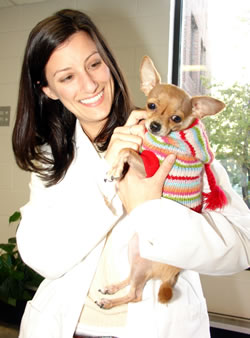Regular veterinary visits should be a part of every dog's life. Your dog will need to visit your vet frequently as a young pup, and will need to go at least once yearly as an adult. If your dog becomes sick or gets hurt at any time, this will be the first place you take him. Hence, it is important that going to the veterinary office be pleasant and your dog not be stressed by trips there. This serves not only to reduce stress on your pet, but to allow the veterinary staff to effectively treat your dog. Every experience that your dog has at your vet’s office shapes his memory about that place. A single scary visit, especially during his sensitive socialization period as a puppy can set your dog up to fear the veterinary clinic for life.
 In order for you and your dog to develop a quality relationship, it is important to find a veterinarian that you like and trust. Each dog has different likes and dislikes, and should be handled in a unique way that sets them up for a stress-free visit. A standing relationship is important as your dog learns to trust your veterinarian and you can develop consistency in your dog's care.
In order for you and your dog to develop a quality relationship, it is important to find a veterinarian that you like and trust. Each dog has different likes and dislikes, and should be handled in a unique way that sets them up for a stress-free visit. A standing relationship is important as your dog learns to trust your veterinarian and you can develop consistency in your dog's care.
Every vet visit should be a fun and special time for your dog. Start by bringing your own treats with you at every visit. Your dog can get these treats when he enters the office, when he is showing calm behavior in the waiting room, and when the doctor is handling him and drawing blood or giving vaccinations. Unfortunately if your dog is at the vet for vomiting or diarrhea, treats can likely not be given. In this case you can bring his favorite toy or something that may smell like home along for the trip
If your dog is showing signs of fear or protest to being handled, or simply showing signs of stress while at the clinic, you should consider taking him on subsequent 'happy visits' there. This would involve going to the clinic, waiting in the lobby, getting on the scale, and going into an exam room and being handled at a level where he is comfortable…all while getting treats. Your veterinary can help guide you through what level your pet can handle with each visit.
Gentle, low-stress handling methods should be used by all personnel who interact with your dog at a veterinary office. This means that they should not use punishment, correction, or verbal scolding towards your dog at any time. Handling tools, such as muzzles, Elizabethan collars, head halters, and Calming Caps are appropriate and, sometimes, necessary for many veterinary procedures. You can help your dog maintain a positive experience by associating these tools with food, both in the clinic and at home (between visits). Please ask your veterinarian for guidance on at-home handling tool training.
